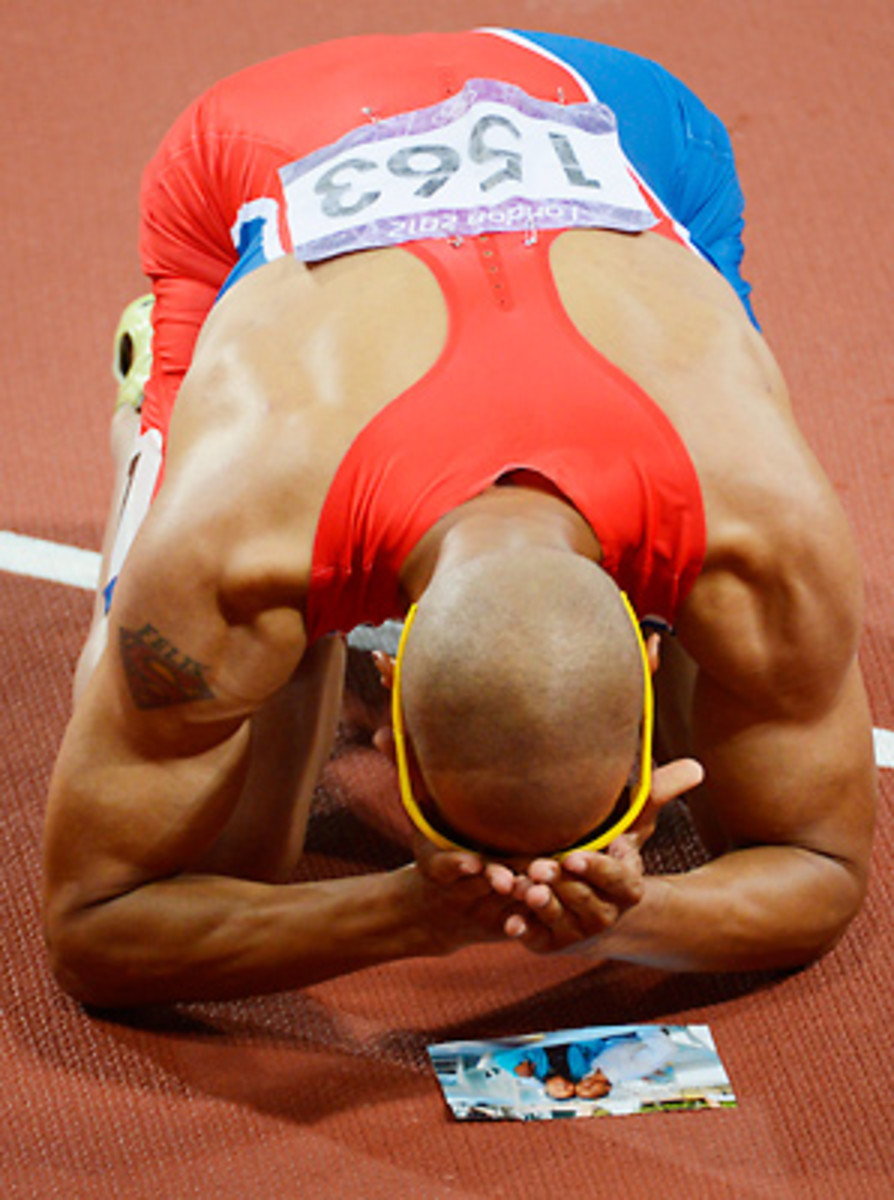
America's 400-meter dynasty ends
LONDON -- The Brits once had an empire on which the sun never set. Now they have a photogenic princess, the Olympics, and a gnarly indoor cycling team. C'est la vie. The U.S., too, has perhaps seen weightier days in terms of global influence. But, hey, America's got LeBron, Hawaii, and complete and utter dominance of any men's track race that requires a single lap. Or, the U.S. had that last one until the London Games, anyway.
On a chilly Monday evening in London's Olympic stadium, the gun shot for the 400-meters, and -- for the first time ever in a non-boycotted Olympics -- not one of the eight men who exploded from the blocks had USA on his chest. In the previous Olympics, the U.S. swept the 400, and only twice in any modern Olympics (1908 and '20) in which the U.S. competed had an American not won a medal. The best way to get a sense of just how good the U.S. is in the one-lapper is to look at best times in the world this year for the 4x400-meter relay (though this should change the day of the Olympic final):
1. University of Florida2. United States "Red" team3. Cuba4. Trinidad and Tobago5. Bahamas6. USC7. Japan8. Belgium9. LSU10. South Plains College11. Penn State
The 400-meter hurdles -- which U.S. men also swept in Beijing -- ran Monday night as well, and Michael Tinsley, who wasn't even supposed to make the U.S. team, took silver and became the lone thread between the U.S. and a goose egg in the one-lap individual events. "The whole season I was under the radar," said Tinsley, who ran 47.91 seconds, to 47.63 for Felix Sanchez of the Dominican Republic. Tinsley was a bright light in an otherwise dark evening for American athletes.
"No, I didn't think I'd ever see this day [with no American in the 400 final]," said Angelo Taylor, who took fifth in the 400-hurdles after winning gold in 2000 and '08. In his Olympic victories, Taylor took 13 steps between hurdles for the first seven of 10 barriers, before switching to 14. On Monday, he had to go to 14 at the fifth hurdle, and was switching hurdling legs for the second-half of the race. "But, you know," the 33-year-old Taylor continued, "I never thought I'd see the day when Jamaica would dominate the sprints. It's a new day, and a new era. Things change."
Taylor said that more countries are studying the 400 and the 400 hurdles, and are forming training groups for the event. He noted that Jamaica, the Dominican Republic, and Puerto Rico have vastly increased their influence in the 400 hurdles since he won his first Olympic title. "I mean, more and more people are getting involved in track and field," Taylor said, "and they're tired of the USA beating up on 'em. They're studying events and having training groups. Just doing what we've been doing all along."
Still, the sun probably has not set on the U.S. long-sprint dynasty just yet. American LaShawn Merritt came into the Games as a favorite to win the 400, but pulled up with a hamstring injury in his 400 heat. American Tony McQuay was another expected medal contender, but he looked flat in London -- after a long college season in which he won the national championship for Florida -- and failed to make the final. His college time would have put him fourth in the Olympic final. And two-time world champion 400-hurdler Kerron Clement, who finished last in the final, needed a hernia repair in February and took nine weeks to recover. Clement was in tears after the race, but apparently just overwhelmed by emotion of participating in the Olympic final after a difficult year, even though he took silver in Beijing.
"Leading up to the Olympic trials, I was like, How will I make the team?" Clement said as he fought back his emotions. "I didn't know how because I couldn't hurdle. And I made the team, and I made the Olympic final. I'm a fighter." So it could just be a case of historically bad timing for the U.S.
Plus, the U.S. had plenty of influence on the winner of the 400-meter hurdles. Felix Sanchez -- he and Taylor have alternated gold for the last four Olympics -- was born in the heavily Dominican Washington Heights neighborhood in upper Manhattan, and grew up in San Diego. He represents the Dominican Republic as a tie to his heritage, and he provided one of the most touching moments of the Olympics.
When the 34-year-old -- who was written off as past his prime -- crossed the line first, he reached into his spandex suit and whipped out a photograph of his grandmother, placed it on the ground and kissed it. Four years ago, on the morning of his first race in the Beijing Olympics, Sanchez learned that his grandmother had died. Sanchez almost didn't run, and when he did he posted one of the slowest times in the entire competition. But he promised his late grandmother he would win her a medal.
When he stepped atop the podium, under a light rain, he melted into tears, and bawled and convulsed through the entire ceremony. "It's an amazing feeling," Sanchez said. "When I got on the medal stand, it started raining, and it made me feel my grandmother was crying tears of joy." Sometimes, it's not so bad for someone else to win.





